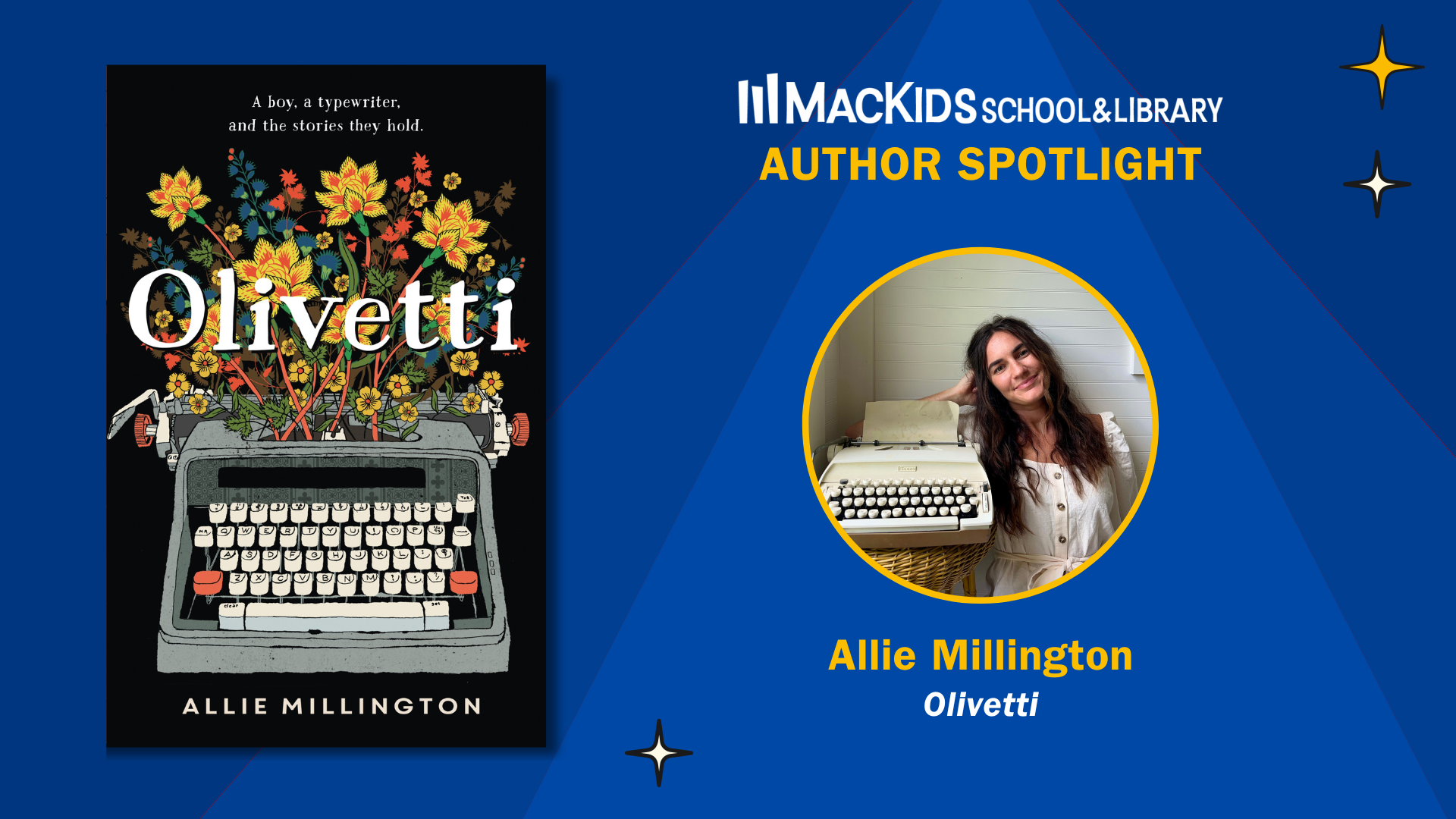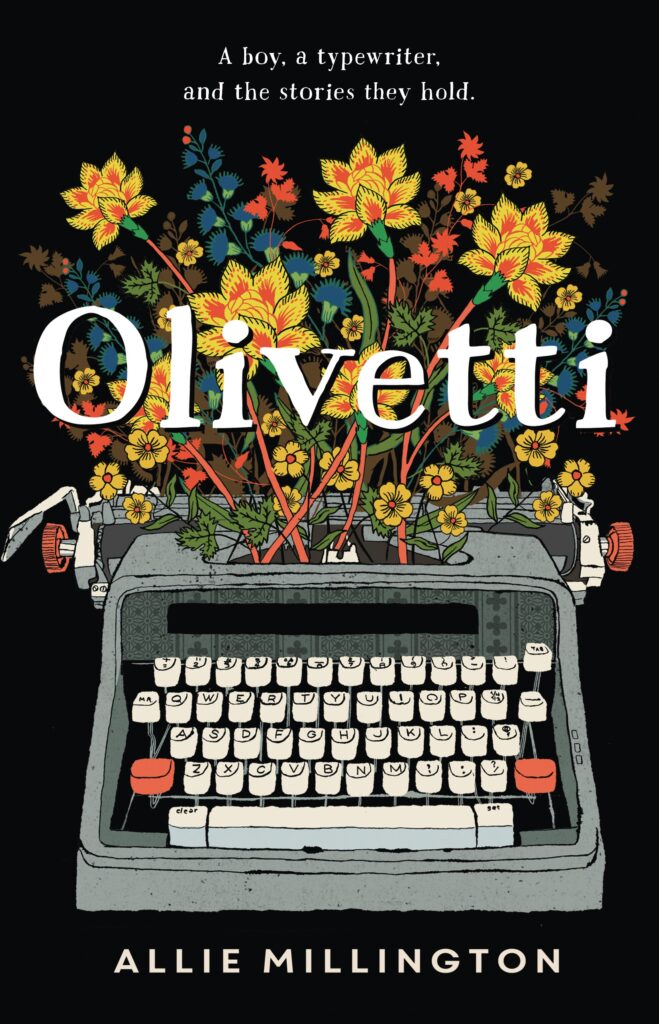MacKids Spotlight: Allie Millington

This month’s Author Spotlight highlights Allie Millington, the author of Olivetti, a heartfelt debut middle-grade novel told from the unique vantage points of an introverted boy and his missing mother’s cherished typewriter. It’s also already received two starred reviews this year!
Can you tell us about what inspired you to write Olivetti?
While facing rejection on my writing journey, my husband gifted me a typewriter to encourage me to keep going. As I began using it, I started wondering who else might have typed on those same keys . . . and what other stories this typewriter had heard. I was enthralled by the thought that this machine was privy to people’s innermost feelings and memories and secrets. And that those words could still be held somewhere inside its steel frame, even after that person was gone.
The idea for Olivetti feels very much like it was divinely dropped into my head from above. It came to me in the form of a question: “What if a typewriter could type back?” And it was a question I just had to explore.
Olivetti is your debut middle grade novel. You mention that you first wrote it on your own antique typewriter! In what ways did beginning to write this book on your typewriter inform and shape the story?
Yes, I did start off writing this story on my typewriter, which helped me connect with the narrator in a very literal hands-on way. By actually using the keys and feeding in paper, I felt like I was able to tap into the mind of my typewriter (couldn’t help myself there). It was really enjoyable trying to understand how typewriters might view the world, and discovering their frame of reference for how they might describe things. I was surprised at how endless that exploration seemed, even within the limitations of a stationary character.
This not only shaped my story, but it shaped me as a writer, and also as a human. Now anytime I see a typewriter in public I can’t help but want to go have a conversation with it.
Olivetti is a unique novel that alternates between the point of view of twelve year old Ernest and a typewriter named Olivetti. Why was it important for Olivetti to have a voice, and did you always know you wanted him to have his own point of view?
Something that has shaped a lot of my writing is asking the question, “Who have we not heard a story from before?” I thought a typewriter’s untold side of the story deserved to be shared, and that given the chance, they’d naturally have a lot to say, being full of words.
From the beginning, Olivetti had such a strong voice that I couldn’t not make the story about him. You could say he insisted on it. He also offered a unique perspective on the Brindle family (the humans he lives with) as someone who has observed them and kept their memories for years, and has seen the ways they’ve changed. Of course, having an inanimate object as a main character has its challenges, so having Ernest’s point of view was important and necessary to tell the full story.
Throughout the book, readers will discover that Ernest finds comfort in words. When a moment becomes particularly difficult, he begins to say synonymous words. Can you tell us more about this?
Ernest’s habit of internally reciting words from his dictionaries is a way he copes with anxious situations. He often feels like he doesn’t have the right words to say, or that they aren’t ‘good enough’, which is an insecurity he and I share. I liked exploring the juxtaposition between Ernest and Olivetti, in that Ernest has the ability to speak but never feels like he has the words he needs, while Olivetti is full of words but can’t get them out. I wanted to create relatable characters for anyone who is struggling to find their voice.
What was the first book that made you fall in love with reading?
I’m grateful to have had a childhood surrounded by stories, so this is difficult to narrow down! Reading the Inkheart series by Cornelia Funke was the first time I had the exciting revelation that authors can make their own rules within their books. And that maybe there weren’t really any rules in writing a book to begin with. The Series of Unfortunate Events by Lemony Snicket also had me infatuated, and showed me a book can be told in any way you want it to be, too.
Tell us about a library, librarian, or educator who made an impact on you as a child (or as an adult!).
My fifth-grade English teacher, Mr. Lemmo, was the first person who showed me my words were worth sharing. I came into class one day and found a story I’d written for a previous project passed out on every desk. Mr. Lemmo didn’t make a fuss of saying who wrote it, only that we’d all be using it for our independent reading time because he enjoyed the story so much. Twelve-year-old me was both elated and mortified! But it was the biggest boost of confidence knowing my teacher took the time to print out copies of my little story to share with all his classes. It was the first time my dream of becoming an author felt incredibly possible.
What advice would you give to students who are aspiring writers?
I wish I could go back and tell my younger self (in writing and in life): Don’t be afraid to trust your voice. It might start off sounding shaky or uncertain, and people might not listen at first, but what you have to say is incredibly important. And only you can say it.
Try strange ideas. Take risks. And above all else, play. This is a lesson I’m still learning: play over perfectionism. Writing can be a hard thing to do if you aren’t letting yourself have fun.
Do you have a favorite character in Olivetti, or one that you relate to most?
I relate to quite a few of my characters—Olivetti with his old soul, Ernest with his struggle for words, Quinn with her broken overall strap and tendency of collecting things, Beatrice with her big-hearted emotions and desire to find meaning in the small things. Even Remington with her many typos!
How do you hope Olivetti will be used in classrooms and libraries? What do you hope young readers will take away from your novel?
For one, I hope more young readers will start using typewriters! I also hope this book can foster conversations about the importance of passing down stories between families and loved ones. There is much to gain in slowing down to reflect and remember things in our past, the things that make us who we are. I think there is a very real kind of magic in memories, even in the little moments that might seem irrelevant at the time.
Additionally, I’d love for this novel to be an encouragement to those who are alone or stuck in their feelings. I hope it can be a place they feel seen.
ABOUT THE AUTHOR
ABOUT THE AUTHOR:

Allie Millington first wrote Olivetti on her own antique typewriter, who turned out to have an awful lot to say. She lives near Atlanta, Georgia, with her husband and their fluffy dog, Crumpet. You can frequently find her doodling in her writing shed, or foraging in the woods. Olivetti is her debut middle grade novel.
ABOUT THE BOOK:

Olivetti
On Sale: 03/26/24
Ages 8-12
A heartfelt debut middle-grade told from the unique vantage points of a witty typewriter and an introverted boy—for fans of Wishtree and A Rover’s Story.
Being a typewriter is not as easy as it looks. Surrounded by books (notorious attention hogs) and recently replaced by a computer, Olivetti has been forgotten by the Brindle family—the family he’s lived with for years. The Brindles are busy humans, apart from 12-year-old Ernest, who would rather be left alone with his collection of Oxford English Dictionaries. The least they could do was remember Olivetti once in a while, since he remembers every word they’ve typed on him. It’s a thankless job, keeping memories alive.
Olivetti gets a rare glimpse of action from Ernest’s mom, Beatrice—his used-to-be most frequent visitor—only for her to drop him off at Heartland Pawn Shop and leave him helplessly behind. When Olivetti learns Beatrice has mysteriously gone missing afterward, he believes he can help find her. He breaks the only rule of the “typewriterly code” and types back to Ernest, divulging Beatrice’s memories stored inside him.
Their search takes them across San Francisco—chasing clues, maybe committing a few misdemeanors. As Olivetti spills out the past, Ernest is forced to face what he and his family have been running from, The Everything That Happened. Only by working together will they find Beatrice, belonging, and the parts of themselves they’ve lost.


